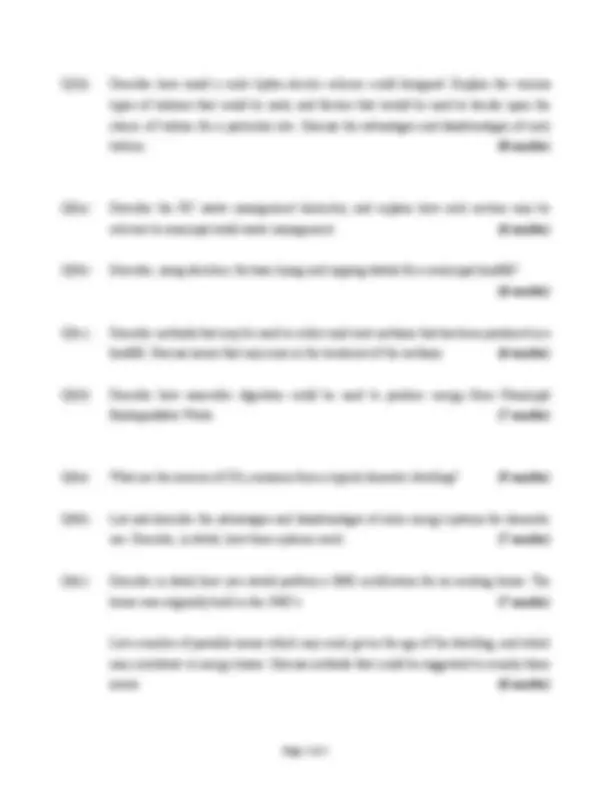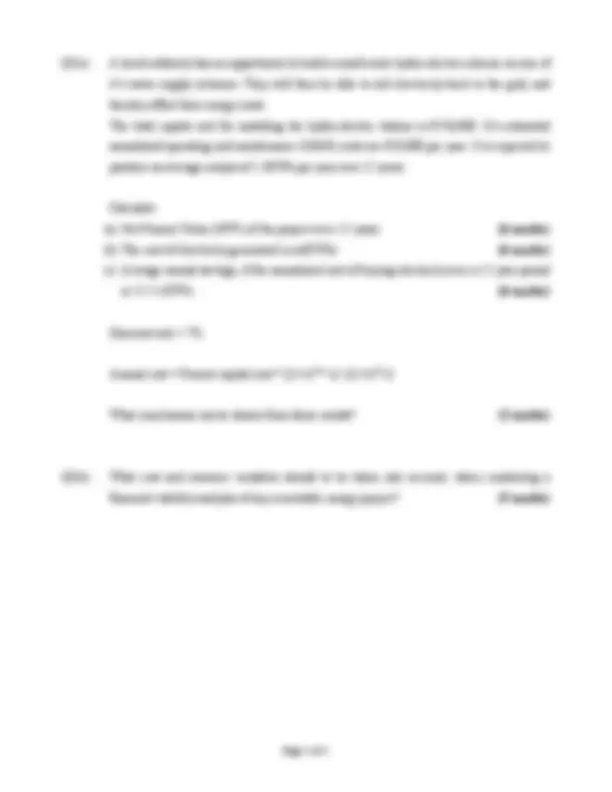




Study with the several resources on Docsity

Earn points by helping other students or get them with a premium plan


Prepare for your exams
Study with the several resources on Docsity

Earn points to download
Earn points by helping other students or get them with a premium plan
Community
Ask the community for help and clear up your study doubts
Discover the best universities in your country according to Docsity users
Free resources
Download our free guides on studying techniques, anxiety management strategies, and thesis advice from Docsity tutors
An examination paper for the environmental engineering 2 module (civl7007) in the bachelor of engineering in civil engineering programme at cork institute of technology. Instructions for candidates, requirements for the examination, and four questions covering topics such as preparing an environmental impact statement, wind turbine systems, hydro-electric schemes, waste management, and energy systems. The questions require candidates to describe layouts, address impacts, calculate energy production, and discuss design options and advantages.
Typology: Exams
1 / 4

This page cannot be seen from the preview
Don't miss anything!



Semester 2 Examinations 2009/
Module Code: CIVL
School: Building and Civil Engineering
Programme Title: Bachelor of Engineering in Civil Engineering
Programme Code: CCIVL_7_Y3 / CCIVE_7_Y
External Examiner(s): Ms. M. Kyne, Mr. J. Murphy Internal Examiner(s): Mr TL O’Driscoll, Mr S Harrington
Instructions: Answer four questions.
Duration: 2 hours
Sitting: Summer 2010
Requirements for this examination:
Note to Candidates: Please check the Programme Title and the Module Title to ensure that you have received the correct examination paper. If in doubt please contact an Invigilator.
Q1. An Environmental Impact Statement is to be prepared for a new gas fired power station in Cork Harbour.
(a) Describe the overall layout of the EIS to be submitted. (4 marks) (b) Describe how any impacts may be addressed in the EIS under the following headings: (i) Human Beings (4 marks) (ii) Landscape ( 4 marks) (iii) Air (4 marks) (iv) Material Assets. (4 marks) Describe the context, character, significance, sensitivity of each of the possible impacts and any possible mitigation measures that may be proposed for each.
(c) The project will require a new IPPC license. Describe the overall IPPC license application procedure for the project. (5 marks)
Q2(a) Compare two possible options for a wind turbine system design as follows: Option A: 3 turbines @ 85m height, with 3 rotors, each 30m long. Option B: 1 turbine @ 125m high, with 3 rotors, each 50m long.
The annual average wind-speed at the site is 6.5m/s @ 85m height. Ground roughness class at the site = 1 Roughness length = 0.03m. K=3.2 for both options.
Average annual power (kWh/year) = K.Vm^3 .At .T
VZ = Vref * [ln(Z/Z 0 )/ln(Zref /Z 0 )] . Which system will provide the most energy per year? (10 marks)
What other factors would need to be taken into account when deciding on the best option for the wind energy system above? (7 marks)
Q5(a) A local authority has an opportunity to build a small-scale hydro-electric scheme on one of it’s water supply schemes. They will then be able to sell electricity back to the grid, and thereby offset their energy costs. The total capital cost for installing the hydro-electric turbine is €550,000. It’s estimated annualized operating and maintenance (O&M) costs are €10,000 per year. It is expected to produce an average output of 1.3GWh per year over 15 years.
Calculate: (a) Net Present Value (NPV) of the project over 15 years. (6 marks) (b) The cost of electricity generated (cent/KWh). (6 marks) (c) Average annual savings, if the annualized cost of buying electricity over a 15 year period is 12.5 c/KWh. (6 marks)
Discount rate = 7%
Annual cost = Present capital cost * [(1+r)n^ * r] / [(1+r) n^ -1]
What conclusions can be drawn from these results? (2 marks)
Q5(b) What cost and resource variables should to be taken into account, when conducting a financial viability analysis of any renewable energy project? (5 marks)